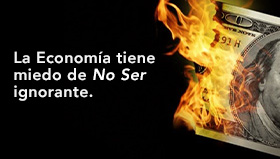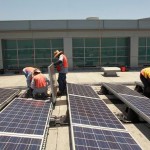Greetings to all our readers, those who take 5 minutes to read these lines, thanks!
In “Climate Wars”, a book written by Harald Welzer, a German sociologist and social psychologist, a report from the Federal Government for the Global Environmental Transformations Scientific Council is mentioned, which says that nowadays, there are 1.000 million people who do not have a secure access to a good quantity and quality of drinkable water. It also says that 850 million people in the world suffer from hunger… so we are speaking of nearly 2 billion (2.000.000.000) people who have serious issues in finding water and food. Basic… An astounding fact… We are now nearly 7 billion people in the world. So 29% of the world’s population has really bad conditions for growth and intellectual cultivation through positive experiences, and for doing proactive things, by the mere fact of having as prime priority to drink and eat… and that is the same percentage of being born in this world with those same possibilities…
The wider variations in precipitations and availability of water, as well as the reduction of cultivable surfaces, are problems which get worse through climate change, and only help to enlarge those numbers…
Harald Welzer thinks that “climate change is not only an environmental policy issue with the utmost urgency, but, at the same time, constitutes the Modernity’s biggest social challenge, by threatening the survival opportunities of millions of people, and forcing them to mass migrations. This leads us to the inevitable situation of knowing what to do with those masses of irregular migrants who no longer can live in the places they come from and want to have a share of the survival opportunities present in the privileged countries.”
And us, Argentina, we are certainly a privileged country due to our natural resources, as long as we know how to manage them. I doubt our politicians are thinking the possibilities of receiving big masses of environmental refugees in the near future. How would we receive them? Would we receive them in the first place? Will our resources be sufficient for everyone? It would be wise to approach these issues with no fear for change. In the book it says that “Sir Nicholas Stern, ex economist in chief of the World Bank, calculated that the costs for not acting to stop climate change will demand between 5% to 20% (most likely the latter) of the global per capita income. Instead, stabilizing the carbon dioxide emission for 2050 would cost just 1% of the global GDP, which would be absolutely conceivable with a normal development of the economy.” (the bold is always mine)
Hence, it is possible. Starting locally, our country should start creating migratory plans, to know how to control the inflow of environmental refugees, as well as dealing with the implementation of policies which protect the environment, for the conservation and exploitation of natural resources, combined with a new economy which allows changing the energetic matrix as well as assuring the wellbeing of society…
This all sounds quite utopic… but it wouldn’t if everyone, and I mean everyone indeed, had real consciousness on global issues. And by being conscious of the problem, one can really perceive it, and automatically stops ignoring it. And the media shows slightly the truth… or do they tell us how is everything going in Haiti? And in Sudan? They don’t tell us anything… The newspaper’s front page or the hot news on the TV are only glimpses of reality, the tip of the iceberg. Welzer says that “the deciding factor for people’s conduct in specific situations are not the objective conditions of those situations, but their perceptions and the way in which they interpret them. Only interpretation leads to a conclusion and this one leads to action.” And in order to perceive and interpret, we have to deepen our knowledge in these issues, and it seems that no one will help us doing this (and it is not convenient for some people). Hence, once more, it is us who need to generate consciousness among our loved ones about the importance of climate change, renewable energies, shifts in education, the pure essence of living…
What is difficult is to brake the short term thinking with which we were taught to make decisions and learn to see further on.
Welzer says: “the thing gets more complicated when, as happens with climate change, the causes of the problems go back to at least half a century and were impossible to conceive given the state of scientific research at that time on natural science. And it all gets even more complicated when the actual strategies to fight back the consequences of those unpredictable actions can only provide uncertain success and, regretfully, in a long run. In this case, that temporal relation between the action and its consequences extends through generations and, independently form that, we can only understand it through what science tells us. It is practically impossible to experiment it in a sensible manner, which constitutes a huge obstacle when you need to motivate people to take action, and it also does not help us to take at least some part of the responsibility for today’s global problems.”
Hence, LET US MOTIVATE OURSELVES TO TAKE ACTION.
I wish you the best, as always.
Ploff. It is not environmentalism, it is changing the world.
Brian Longstaff.-

















Leave a Comment